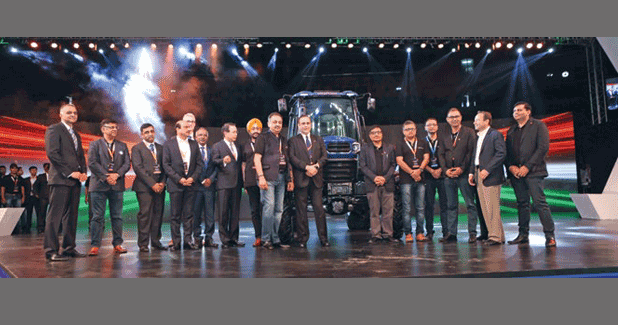
Escorts announces new ventures
<span style="font-weight: bold;">One of India's leading engineering conglomerates, Escorts makes two significant announcements in a fortnight, setting new avenues for growth.</span><p></p><p> In late August, Escorts announced plans to manufacture rough terrain (RT) and truck-mounted cranes in joint venture (JV) with Tadano Ltd. And then in early September, it went on to unveil the country's first Automated Concept Tractor in association with seven technology companies, at its annual innovation platform, Esclusive 2018.</p><p>The JV with Tadano seeks to combine the cost-effective frugal Indian engineering of Escorts and Japan's biggest and world's leading mobile crane manufacturer, Tadano, to meet the growing market for high tonnage and technologically advanced RT and truck-mounted cranes in the 20 to 80 tonnage categories.</p><p>Speaking to Equipment India on the sidelines of the announcement, <span style="font-weight: bold;">Nikhil Nanda, Chairman & Managing Director, Escorts </span>said,'The construction business is showing some positive signals and we have invested robustly in all its platforms. We are introducing newer technologies and applications in terms of the need that we are seeing in the market.'</p><p><span style="font-weight: bold;">Koichi Tadano, President & CEO, Tadano </span>observed to the magazine,'For the success of the JV, we have to do many things with a long-term vision and mutual trust, and also patience. We'll bring in the latest technologies but their cost, efficiency and quality will also be important factors.' </p><p>Escorts, which has seen its revenues nearing Rs 10 billion, expects the positive sentiment to sustain in the long-term and is progressively enhancing production at its manufacturing plants in Faridabad, Haryana.</p><p> <span style="font-weight: bold;">Eye on export market</span><br />The JV between Tadano and Escorts will also enable both companies to increase their current and future capabilities in the segment globally in the medium to long-term. Informed Nanda,'In the initial years, we will focus on the domestic market. And once we have consistently and diligently achieved our targets here, the manufacturing base will be opened up for the international markets as well.'</p><p><span style="font-weight: bold;">Bharat Madan, CFO, Escorts</span> added,'We are open to explore the potential to export products that would be manufactured under the JV and will, therefore, look at sourcing components from India for which there is a global requirement; that's another big opportunity.' But that would be subject to the development of a competent vendor base capable of supplying quality equipment.</p><p>Tadano and Escort would initially invest Rs 600 million in the partnership, with 51 per cent contributed by Tadano and 49 per cent by Escorts for product development. The investment will increase as more products get added to the portfolio. Escorts' Faridabad plant that manufactures high-end rough terrain (RT) cranes will be transferred to the JV. Escorts presently turns out 24 RT cranes in a year. </p><p> <span style="font-weight: bold;">India's First Automated Concept Tractor</span><br />Launched in collaboration with Microsoft, Reliance Jio, Trimble, Samvardhana Motherson Group, WABCO, BOSCH and AVL, the development of the automated concept tractor is seen by the company as one of the first steps towards the development of a range of high technology farming solutions. According to a company release, these farm machines will encompass electric transmissions, autonomous applications, remote vehicle management, data-based soil and crop management and sensor-based guided farm applications. Earlier, the company had launched electric and hydrostatic tractors in late 2017.</p><p>Averred Nanda,'An autonomous tractor by itself means nothing as you need to create an ecosystem for smart farming. We have brought in partners who have the knowledge and technology that we can marry with our tractors and implements to tell farmers what they need to do to maximise profitability.' According to the federal government's Economic Survey 2017-18 document, the country's agriculture sector adapted to farm mechanisation much faster in the last fiscal than in the recent past. The Indian tractor industry has emerged as the largest in the world and accounts for about one-third of total global tractor production. Moreover, with the World Bank envisioning half of India's population as living in urban centres and the share of farm workers in the total workforce likely to decline to 26 per cent by 2050, experts feel that mechanisation needs to move at a much faster clip.</p><p> <span style="font-weight: bold;">- Manish Pant</span></p>


 +91-22-24193000
+91-22-24193000 Subscriber@ASAPPinfoGlobal.com
Subscriber@ASAPPinfoGlobal.com